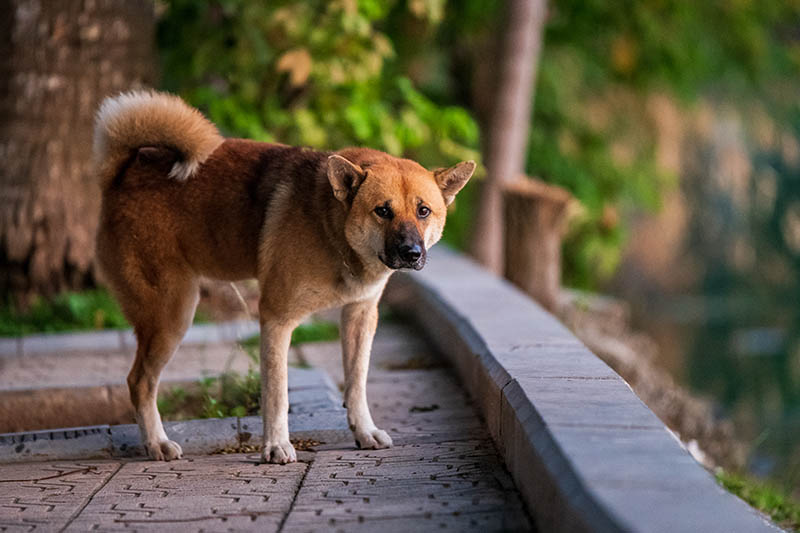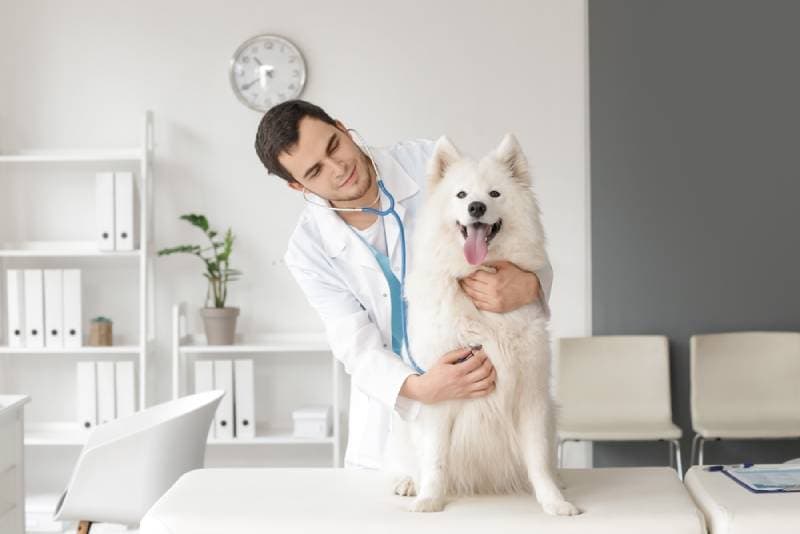
Dehydration is a common problem seen in dogs. It is a condition where your dog loses a higher amount of water and electrolytes than they are able to consume. It can vary in severity. If left to progress it results in a medical emergency. Dogs will eventually develop serious health problems affecting all of the vital organs in their body.
What Is Dehydration in Dogs?
Dogs need water for the normal functioning of their body systems—water is vital to their survival. All of their daily body functions require water in some way to remain healthy and keep things ticking over. Your dog needs to drink water frequently to maintain a balance of fluid and electrolytes in their body otherwise things start to go wrong. If your dog starts to lose more water and electrolytes than they are bringing in, there is an imbalance, and they will start to become dehydrated. Once they start to get dehydrated, unless something is done quickly, this can rapidly lead to organ failure, collapse, and unconsciousness and it can eventually be fatal.
In a healthy dog, as they go about their day-to-day activities, there are natural ways that they lose water. This includes things we are all familiar with such as:
Drinking and eating replenish the water and electrolytes that are lost from the activities above.
Things start to go wrong if the fluid intake somehow becomes lower than the fluid being lost. When this imbalance occurs, dehydration starts to develop. An overall reduction in the fluid in the body means that the circulating blood volume is lower. This in turn means that the blood will not be delivering as much oxygen to the organs and muscles around the body.
The electrolytes in the body are naturally occurring minerals. They too are required for the essential functioning of the body. Electrolytes include potassium, sodium, and chloride. They facilitate muscle function, regulate nerve impulses, and aid in the movement of important nutrients into and out of cells. When your dog becomes dehydrated, some electrolytes get flushed out of the body and others become concentrated in the blood. This is very disruptive and can be dangerous.

What Are the Signs of Dehydration in Dogs?
It can be tricky to spot signs of dehydration in the early stages as a lot of the clinical signs are quite subtle. As the dehydration progresses the signs will be very obvious. It is important for owners to be able to spot them early on so they can respond quickly.
If you see any of these signs in your dog, seek veterinary help immediately.
What Are the Causes of Dehydration?
In simple terms, the cause of dehydration is either a lack of water intake or an increase in losses. In reality, it can be slightly more complicated than this. There are a few common causes that vets often see in dogs:
Lack of water intake
If a dog does not have access to water if they are left too long on their own and run out of drinking water, or if they are not drinking enough despite being offered.
Lack of food intake
If a dog is not eating, this will reduce the amount of water and electrolytes they are bringing into their body. It will not have as profound an effect as a lack of water, but it will still mean a reduction in the intake of fluid.

Vomiting and diarrhea
Both vomiting and diarrhea cause increased loss of water and electrolytes as fluid from the body makes up the majority of the vomit and loose feces passed out of the dog’s body.
Excessive breathing/panting
Water is lost through breathing and panting. If a dog is panting or breathing excessively this can cause more water to be lost than usual. Often panting is seen alongside other factors contributing to dehydration such as overheating or illness. It can often exacerbate the situation.
Excessive urination
There are many reasons a dog may urinate excessively. These include urinary tract infections, bladder infections, kidney disease, endocrine abnormalities, and liver disease. It is very important for your vet to identify the underlying cause in these situations so that they can administer the correct treatment.

Injuries such as burns
Large burn wounds leave the skin barrier damaged and lots of fluid can be lost from the surface of the skin.
Sweating
Dogs sweat from merocrine glands which are located in their paw pads. Sweating is supposed to help cool dogs down but if a dog is overheating, they may sweat excessively and lose excess fluids in the process.
Fever
If your dog has a prolonged increase in body temperature, this increases their breathing rate and metabolism. More moisture is breathed out and this leads to dehydration.
Overheating
Similar to a fever, if a dog is overheating, this increases metabolic activity and breathing/panting so more fluid is lost.

Cancer
Depending on what type of cancer is present and where it is affecting the body, it can cause dehydration.
Long-term illness
Dogs suffering from chronic diseases such as Cushing’s disease, kidney disease, or diabetes are often dehydrated and need to drink more water than usual. Due to the nature of the disease process, even if the dogs do drink more, they are normally still dehydrated.
Very young dogs, elderly dogs, nursing bitches, and dogs with a smaller surface area to volume ratio are all at a higher risk of becoming dehydrated.
Diagnosis of Dehydration in Dogs
You will be able to assess if your dog is dehydrated by checking their “skin tent.” Skin loses its elasticity when there is less moisture in it. If you lift the skin on your dog’s back and it falls back into place slowly instead of moving straight back down, your dog is likely to be dehydrated.
Your vet will be able to assess your dog’s dehydration by examining them, assessing their skin tent, mucous membranes, eyes and, and performing blood tests and urinalysis.
How Do I Care for a Dog with Dehydration?
Treatment of mild dehydration is relatively straightforward. It gets more complicated when severe dehydration with dramatic electrolyte disturbances and potential organ failure takes place. If you think that your dog may be starting to become dehydrated, first offer them fresh water to drink. Be especially vigilant in warmer weather or when your dog has done a lot of exercise. Be aware that dehydrated dogs often lose their appetite then don’t eat so are receiving even less water.
If you think your dog is suffering badly from dehydration, take them to your vet immediately. Your vet will be able to administer subcutaneous or intravenous fluids. Your vet will also take a blood sample and a urine sample to assess the blood cell counts, organ function, and electrolyte numbers and to check how concentrated the urine is, amongst other things. They will then be able to tailor treatment to target the issues experienced by your dog. It is important that your vet identifies the underlying cause to enable them to treat the condition causing the dehydration and prevent it from happening again. Different products can be added to intravenous drips to help stabilize your dog and replenish depleted components of the blood.
Your dog may have to be hospitalized for several days while they are monitored.

Frequently Asked Questions (FAQ)
How quickly can my dog become dehydrated?
Dogs can usually survive for approximately 72 hours without drinking water, although they will start showing signs of dehydration in the first 24 hours. After this initial period, they will start to get very sick very quickly.
How can I rehydrate my dog at home?
If your dog is only very mildly dehydrated, you can attempt to rehydrate them at home by offering them water. The best approach is to let them sip small amounts little and often. Be aware that if your dog has an electrolyte imbalance, water alone will not rectify this so you may need to take your dog to the vet to get them checked out.
Will a dog still pass urine if they are dehydrated?
The urine output is influenced in some ways by the hydration status of the dog. Therefore, if the dog is dehydrated, the urine output will be reduced. However, there are some conditions such as kidney failure and diabetes where the dog can be very dehydrated yet still produce excessive amounts of urine. So, if you see your dog urinating well, bear in mind they may still be dehydrated.
Conclusion
Dehydration is a very common occurrence for dogs. There can be a simple reason behind the dehydration that can easily be rectified. Equally, there can be complicated medical issues that require lengthy diagnostic tests and treatment. To keep your dog hydrated, always allow them access to drinking water and be extra vigilant in monitoring their fluid intake on hot days or when they do a lot of exercise.
If you are at all concerned about your dog getting dehydrated, contact your vet for advice.
Featured Image Credit: EugeneEdge, Shutterstock








